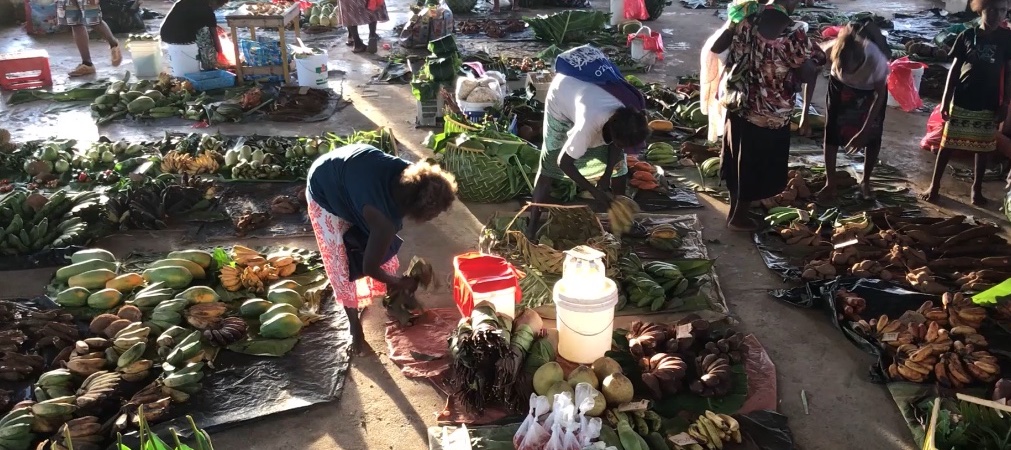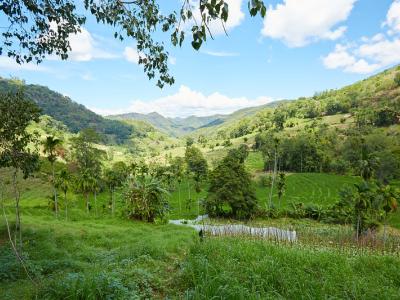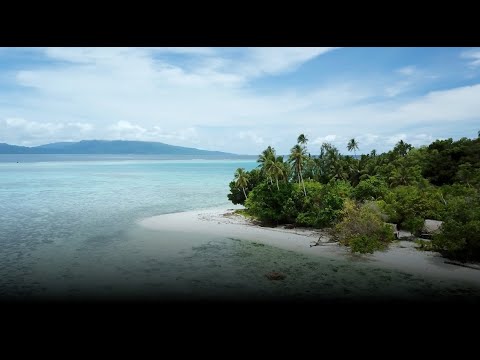
Solomon Islands is a Least Developed Country (LDC) and Small Island Developing State (SIDS) and an archipelago compromised of 994 tropical islands and atolls, two major volcanic mountainous island chains and low-lying coral atolls extending some 1.34 million square kilometers. About 80 percent of the population live in rural, low-lying coastal areas and are predominantly dependent on agriculture, forestry and fisheries for food security and livelihoods, relying mainly on their traditional food production systems, traditional knowledge, and strong communal systems.
The agricultural, forestry and fisheries sector together account for around 40 percent of the country’s GDP and provides employment for most of the population. Main export commodities are timber, accounting for 72 percent of total exports, fisheries (11 percent), agriculture (8 percent) and minerals (seven percent). The country is a low-lying coastal nation highly susceptible to natural disasters, vulnerable to external shocks, with expensive public administration and infrastructure due to its small size, remoteness, and limited opportunity to create economies of scale. In this regard, the country may face disproportionately high adaptation and uncertainties over climate change projections and adaptation strategies.
- National Governments
- Food and Agriculture Organization of the United Nations (FAO)
- United Nations Development Programme (UNDP)
- Ministry of Environment, Climate Change, Disaster Management and Meteorology, Government of Solomon Islands
In 2008, the Solomon Islands formulated a National Adaptation Programme of Action (NAPA), prioritizing agriculture, human settlements, water, and sanitation as vulnerable sectors requiring urgent support to enhance resilience against the predicted impacts of climate change. Within its priority adaptation projects, the NAPA also identifies waste management as a key sector to be developed.
The country outlined the policy directives and strategies of the government relating to mitigation of climate change in The National Climate Change Policy 2012-2017 and submitted its first nationally determined contribution (NDC) in 2016. In parallel in 2014, the National Energy Policy was prepared, aiming at increasing access to reliable, affordable, and clean sources of electricity through renewable energy resources and technologies to 100 percent by 2050.
In the Solomon Islands’ NDC, the country aims to increase its emission ambition by targeting a net zero emission by 2050 as compared to 45 percent emission reduction by 2050 in its initial NDC. Around 90 percent of the emission reductions are expected from fossil fuel use and forest carbon sequestration. The country is embarking on applying renewable energy and energy efficient technologies, committing to low-carbon technologies to support sustainable development and clean technologies in both urban and rural areas of the country including biogas. Several cross-sectoral initiatives are contributing to this goal.
In particular, the GEF’s programme, “Stimulating Progress towards Improved Rural Electrification in the Solomons (SPIRES)” aims to reduce the annual growth rate of GHG emissions in the energy and energy end use sector of the Solomon Islands and facilitate the achievement of increased access to electricity in rural communities in the country.
In July 2022, the Government of the Solomon Islands expressed their interest in receiving support from the SCALA programme, which supports countries to build adaptive capacity and reduce greenhouse gas emissions to meet targets set out in their National Adaptation Plans (NAPs) and nationally determined contributions (NDCs).
The country’s priority renewable energy mitigation actions in its NDC include increasing affordability and accessibility to electricity in both urban and rural areas, improving the enabling environment to foster private investment in the electricity sector and consolidating funding opportunities for programme upgrading and upscaling.
To attain these objectives, and to strategically contribute to GEF’s SPIRES programme and the country’s NAPA and NDC targets, the government of Solomon Islands requests assistance to conduct a feasibility study to set up a biogas plant using pig waste at farm level with the aim of providing sound technical basis to have a lasting impact at farm and community level, contributing to the target of substituting firewood from mangroves for cooking by fostering clean energy production. A two-tier approach is proposed for the study. The two tiers will be separated by a multi-stakeholder consultation to agree on the way forward since specific activities under Tier 2 will depend upon the outcomes of work in Tier 1.
Scope of work
In Tier 1, the feasibility assessment of a pilot farm is developed. The selected farm will be considered as a case study for the feasibility assessment of the valorization of pig manure/slurry and other potentially available agricultural residues, to evaluate the biogas production potential based on available technologies and existing conditions on-site.
Tier 2 will be strongly dependent on the outcome of the feasibility assessment in Tier 1. Particularly, if the profitability of the farm is demonstrated by the Tier 1 analysis, in-depth planning, engineering drawings, and procurement options for the biogas plant and its downstream equipment in the selected farm will be developed and presented to relevant stakeholders.
Conversely, in case of a negative outcome of the feasibility assessment in Tier 1, the team will engage in the sensitivity analysis of the limiting factors that led to the negative outcome. This analysis will unveil the limiting factors/conditions that hinder the feasibility of biogas in the selected outback farm in the Solomon Islands.






